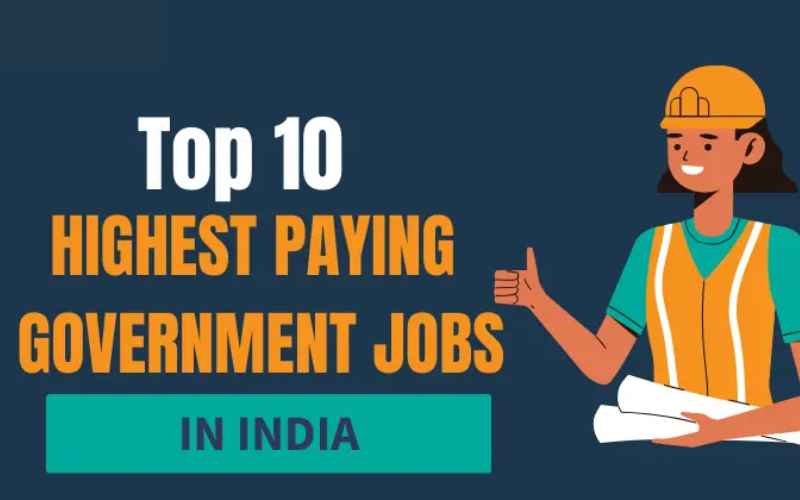The allure of government jobs in India remains strong, not just for their job security and prestige but also for the lucrative salaries and perks they offer. With 2024 presenting numerous opportunities in various sectors, here’s a look at the top 10 highest-paying government jobs in India.

1. Indian Administrative Service (IAS) Officer
Salary Range: ₹56,100 – ₹2,50,000 per month
Perks:
- Official accommodation
- Government vehicle
- Security guard and domestic help
- Medical benefits
- Subsidized bills
IAS officers are key administrators in the Indian government, playing crucial roles in policy formulation and implementation. They enjoy substantial power and influence, along with impressive remuneration.
2. Indian Foreign Service (IFS) Officer
Salary Range: ₹56,100 – ₹2,50,000 per month
Perks:
- Official accommodation abroad
- Government vehicle
- Allowances for children’s education
- Medical benefits
- Free air travel for official and personal trips
IFS officers represent India in international arenas, working in embassies and consulates across the world. The salary and perks are adjusted to ensure a comfortable living standard overseas.
3. Public Sector Undertakings (PSU) Jobs
Salary Range: ₹60,000 – ₹1,80,000 per month
Perks:
- Housing allowances
- Medical benefits
- Performance-related pay
- Gratuity and pension benefits
Jobs in PSUs like ONGC, BHEL, GAIL, and NTPC are highly sought after for their excellent pay packages and additional perks. These roles often involve engineering, management, and administrative duties.
4. Indian Police Service (IPS) Officer
Salary Range: ₹56,100 – ₹2,25,000 per month
Perks:
- Official residence
- Government vehicle
- Security guard and domestic help
- Medical benefits
- Subsidized bills
IPS officers maintain law and order across the country. They enjoy a significant salary along with various perks to support their challenging roles.
5. Defense Services (Army, Navy, Air Force)
Salary Range: ₹50,000 – ₹2,50,000 per month
Perks:
- Free ration and accommodation
- Government vehicle
- Medical benefits
- Pension after retirement
- Travel concessions
Personnel in the defense services are highly respected and receive attractive salaries and benefits, including post-retirement pensions and allowances for their families.
6. Indian Revenue Service (IRS) Officer
Salary Range: ₹56,100 – ₹2,25,000 per month
Perks:
- Official accommodation
- Government vehicle
- Medical benefits
- Subsidized bills
- Retirement benefits
IRS officers handle the nation’s taxation system, playing a crucial role in revenue collection. They enjoy high salaries along with several benefits and allowances.
7. Scientists/Engineers in ISRO and DRDO
Salary Range: ₹75,000 – ₹2,00,000 per month
Perks:
- Research facilities
- Housing allowances
- Medical benefits
- Performance-related incentives
- Pension benefits
Scientists and engineers in ISRO and DRDO work on cutting-edge projects and research. These roles come with high salaries and substantial perks, reflecting the importance of their contributions to national development.
8. Bank PO (Probationary Officer) in Public Sector Banks
Salary Range: ₹40,000 – ₹1,20,000 per month
Perks:
- Housing allowances
- Medical benefits
- Travel concessions
- Retirement benefits
- Performance bonuses
Bank POs have stable career growth with attractive salaries and benefits, making it a preferred choice for many graduates.
9. University Professors (Government Universities)
Salary Range: ₹50,000 – ₹2,00,000 per month
Perks:
- Research grants
- Housing allowances
- Medical benefits
- Pension benefits
- Sabbatical leaves
Professors in government universities receive high salaries along with several benefits, including research grants and retirement benefits.
10. Judicial Services (Judges in High Courts and Supreme Court)
Salary Range: ₹80,000 – ₹2,50,000 per month
Perks:
- Official residence
- Government vehicle
- Security guard and domestic help
- Medical benefits
- Pension benefits
Judges hold esteemed positions in society with significant salaries and numerous perks, reflecting the critical role they play in the judicial system.














